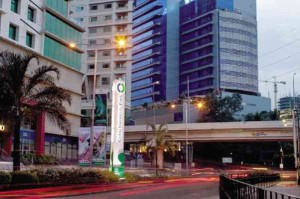
CEBU Business Park is a 50-hectare premier business and commercial district being operated by Ayala-owned Cebu Holdings Inc. Real estate, business outsourcing and tourism fueled Cebu’s growth in 2012. CONTRIBUTED PHOTO
CEBU CITY—The rising cost of space and labor in China and Vietnam is reopening doors for the Philippines’ manufacturing sector as companies are looking at the possibility of moving to Cebu, where the economic landscape is friendlier to foreign direct investments (FDIs).
“Conditions are changing in China and Vietnam. In China, costs are rising because several companies are opening their plants there and they compete for manpower and space. In Vietnam, the concern has to do with an overly centralized system of government and companies have realized that it’s not very easy to deal with the Vietnamese,” said Joel Mari Yu, managing director of Cebu Investment and Promotions Center (CIPC).
Yu said this is good news for Cebu, which had considered manufacturing as a dying industry when companies had moved to neighboring Asian countries because of lower power, labor and space costs in the late ’90s.
He said about a dozen companies from Japan and the United States have approached CIPC and expressed interest in locating to Cebu. These companies are involved mostly in the electronics business. Two manufacture doorknobs and hearing aids.
With these renewed interest, Yu said Cebu faces the challenge of opening up new spaces, where these companies could put up their plants and offices.
He said Mactan Economic Zones 1 and 2 are already filled while Cebu Light Industrial Park is nearing full capacity. These zones are located in Lapu-Lapu City.
“The spaces left for us now are SRP (South Road Properties in Cebu City) and the economic zone in Naga City. For heavy industries, we have Balamban [where shipbuilding companies are located],” Yu explained.
In his presentation during the 27th Confederation of Asia-Pacific Chambers of Commerce and Industry Conference last week, Yu said Cebu has a total of 278 locators, employing more than 170,000 individuals.
In the information technology-business process outsourcing sector, Cebu has 139 locators with 95,000 employees.
Yu reported that Cebu has a total of 500 FDIs in manufacturing, services and tourism. These include Timex, Pentax, IBM, Accenture, Radisson and Marriott.
These companies have total monthly operating expenses of P7 billion, which further fuels Cebu’s economy.
Yu said Cebu’s work force is known to be the best in the world.
“Our work force has demonstrated capability with distinctive competencies and definitive cost advantage. We have a skilled and English-speaking work force, strategic location and we are embedded in a resort environment, where some of the country’s fine beaches and dive spots are located,” said Yu.
However, Yu said high power cost remains an issue in Cebu.
“You just have to admit that this is the cost. It’s almost take it or leave it. We can’t do anything about it. It’s nonnegotiable,” he explained.
But Yu said companies planning to locate in Cebu have conducted research studies and know about this situation. These companies still locate in Cebu because other costs, such as labor and space rental, offset high power costs.